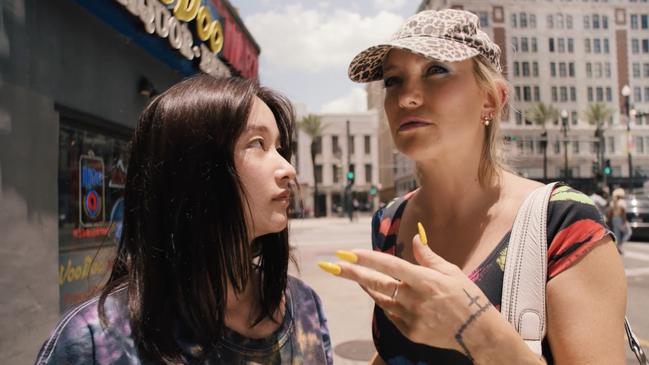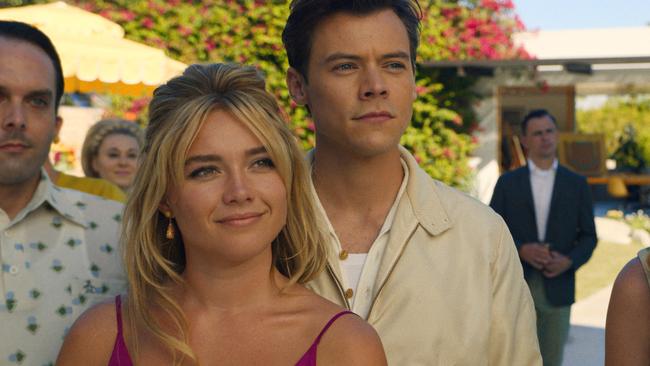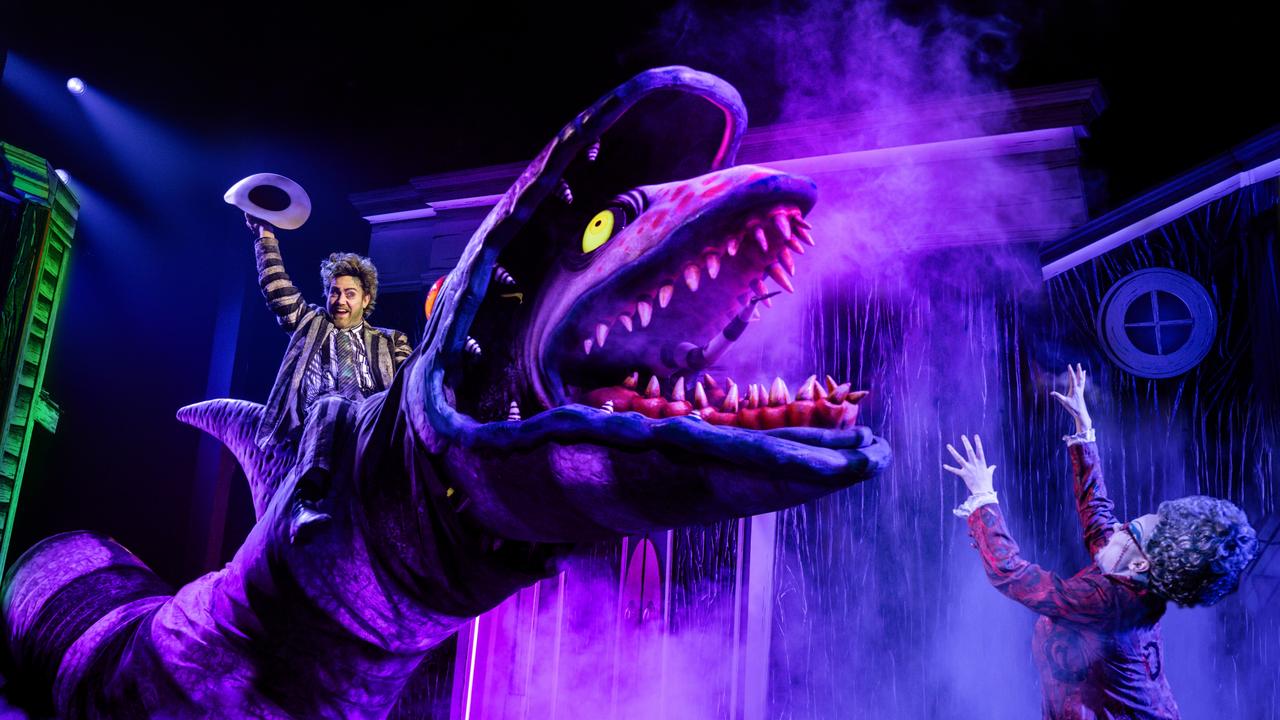Kate Hudson’s suprising role as a pole dancer
The actor plays a pole dancer who works in a strip club called The Panty Drop in Mona Lisa and the Blood Moon.

Mona Lisa and the Blood Moon (MA15+)
In cinemas
★★★★
Writer-director Ana Lily Amirpour’s third feature, after the vampire movie A Girl Walks Home Alone at Night (2014) and The Bad Batch (2016), is a beautifully made drama about a young Korean woman who has telekinetic powers. Set in New Orleans, Mona Lisa and the Blood Moon opens with the camera tracking through the bayou while a version of the famous song Mona Lisa by Jay Livingston and Ray Evans, immortalised in the 1950 Nat King Cole recording, is heard on the soundtrack. The opening titles – in eerie green – are superimposed over the foliage.
Cut to a cell in a mental institution, home to a Korean woman known as Mona Lisa (Jeon Jong-seo) who has been incarcerated for 12 years, since she was 10. When a most unpleasant nurse arrives to clip her toenails, Mona uses her powers to force the nurse against her will to stab herself repeatedly in the leg with the nail clippers. Taking the nurse’s keys, Mona Lisa makes her escape into the garish city streets still wearing a straitjacket. Here she meets a variety of outcast characters, some friendly, some hostile.
Among them are Fuzz (Ed Skrein), a street kid whose shirt she acquires, losing the straitjacket. In a diner she encounters Bonnie Belle (Kate Hudson), a pole dancer who works in a strip club (The Panty Drop). Bonnie takes her in hand mainly so that she can use Mona’s powers to force a bunch of nerdy kids to hand over their cash and later to rob ATMs.
Meanwhile Officer Harold (Craig Robinson), a cop Mona forced to shoot himself in the leg, is hobbling after her in hot pursuit. Mona also forms a friendship with Bonnie’s 11-year-old son, Charlie (Evan Whitten).
This is an unusual film in which much, including Mona’s backstory and the source of her powers, is barely explained. It doesn’t matter, though, as the film is essentially a mood piece and quite an effective one, despite its moments of violence.
The music score, by Daniele Luppi, is particularly fine while the cinematography, by Pawel Pogorzelski, is constantly impressive as the backstreets of New Orleans are transformed into a kind of garish hell on earth.
-
Don’t Worry Darling (M)
In cinemas
★★★
Anyone who follows movie gossip will be aware by now that Don’t Worry Darling, Olivia Wilde’s second feature, after the amiable Booksmart (2019), was a troubled production. The leading actor, Shia LaBeouf, was replaced and there was apparently a feud between the director and her leading lady. So what’s it all about?
The setting is a closed community located in desert country in what is presumably the 1950s – though a couple of scenes in which computers are shown and mobile phones referenced intriguingly suggest otherwise. In a cul-de-sac, several couples live in identical houses provided by Victory, the mysterious firm run by Frank (Chris Pine giving an excellent portrayal of sinister charm). Every morning the husbands enjoy a cooked breakfast and then drive off in their big post-war cars in a neat procession to work at Victory Project, where they’re engaged in “the development of progressive materials”.
The wives left behind clean the house and then gather for cocktails and gossip, or perhaps a session of ballet lessons run by Shelley (Gemma Chan), Frank’s trophy wife. Occasionally buildings shake as though an earthquake is taking place – or is it?
Katie Silberman’s screenplay sets up a mildly intriguing sci-fi premise – inspired, no doubt, by The Stepford Wives.

The young couple with whom we are most invested are Alice (Florence Pugh) and Jack (British singer-songwriter Harry Styles in his first film).
They’re passionately in love with each other and Jack is earmarked for promotion by Frank.
But when Alice, taking a ride on the Victory Line trolley car, sees a plane crash in the desert and wanders into the forbidden territory of Victory’s mountaintop headquarters, she begins to have doubts about the entire set-up.
After this promising start the film seems not to know quite where to go next. The ending is certainly a let-down, and perhaps the screenplay should have had another rewrite. Numerous scenes in which Alice dreams of kaleidoscopic, Busby Berkeley-like musical routines have little relevance to the main narrative, and though the film is handsomely produced and competently acted – Styles makes quite an impression – it never delivers the goods in a satisfactory way.
-The Night of the 12th (La Nuit du 12) (M)
In cinemas
★★★★
A deeply disturbing police procedural, based on a real-life unsolved case, The Night of the 12th is another impressive film from director Dominik Moll, whose Harry, He’s Here to Help (2000), his second feature, established him as a fine director of thrillers.
At the outset this bleakly impressive film, which is set in the beautiful area around Grenoble, warns the viewer that 20 per cent of murders committed annually in France remain unsolved, and that this is one of them. Clara Royer (Lula Cotton-Frapier), a vivacious young woman, has spent the evening of October 12, 2016, with her best friend, Nanie (Pauline Serieys). She leaves Nanie’s home at 3am and sends her friend a cheerful text. But before she reaches her own home she’s accosted by a hooded man who throws petrol on her and sets her on fire. The cruelty and wickedness of this act leaves a lasting impression on the viewer.
Investigating police led by Yohan (Bastien Bouillon) and veteran Marceau (Bouli Lanners) soon discover Clara had several boyfriends, all of whom she slept with. Was her murder the act of a jealous lover? Any one of the men in her life could have been the killer. Is she, as Marceau clearly feels, to be condemned for her free and easy attitude towards sex (she got what was coming to her) or should the dead girl’s right to behave as she wished on her own terms be vigorously defended, as Yohan and Nanie believe?
Moll and his regular co-writer Gilles Marchand, working from a book by Pauline Guena, also explore the effect of the investigation on the police involved. Marceau’s marriage is breaking up; his wife is pregnant by another man, and as a result he’s moody and angry and sometimes violent and not disposed to be terribly sympathetic towards the dead girl.
After three fruitless years of probing into the vicious killing, an investigating judge (Anouk Grinberg) suggests to Yohan that the police stake out Clara’s grave on the anniversary of her murder. Moll, an excellent director, explores all these themes with intelligence and a clinical approach. The Night of the 12th is a sad, sobering film but, despite the foreshadowed lack of a resolution, a very gripping one.
-
A Taste of Hunger (Smagen af sult) (M)
In cinemas
★★★★
During the past few years Copenhagen has received a well-earned reputation as a gourmet centre of Europe. A Taste of Hunger, directed by Christoffer Boe, is a well-made but conventionally plotted drama about the personal lives of a Danish master chef and his wife.
The film opens as Carsten (Nikolaj Coster-Waldau) is anxiously awaiting the anticipated arrival of a visiting Michelin Guide assessor; he hopes and believes the anonymous expert will give his restaurant, Malus, the recognition he craves. But something goes wrong and a sous-chef, Frank (Rasmus Hammerich) serves up oysters with over-fermented lemons. The suspected Michelin agent leaves and Carsten’s wife, Maggie (Katrine Greis-Rosenthal) spends much of the night going from smart hotel to smart hotel in search of him, without success.
Flashbacks illustrate how Carsten and Maggie first met, how they married and had two children; and how Maggie had an affair with junior chef Frederik (Charlie Gustafsson).
Well made and well acted, and with a fascinating backdrop of top-class cooking and food preparation, the film suffers only from its somewhat predictable plot.




To join the conversation, please log in. Don't have an account? Register
Join the conversation, you are commenting as Logout